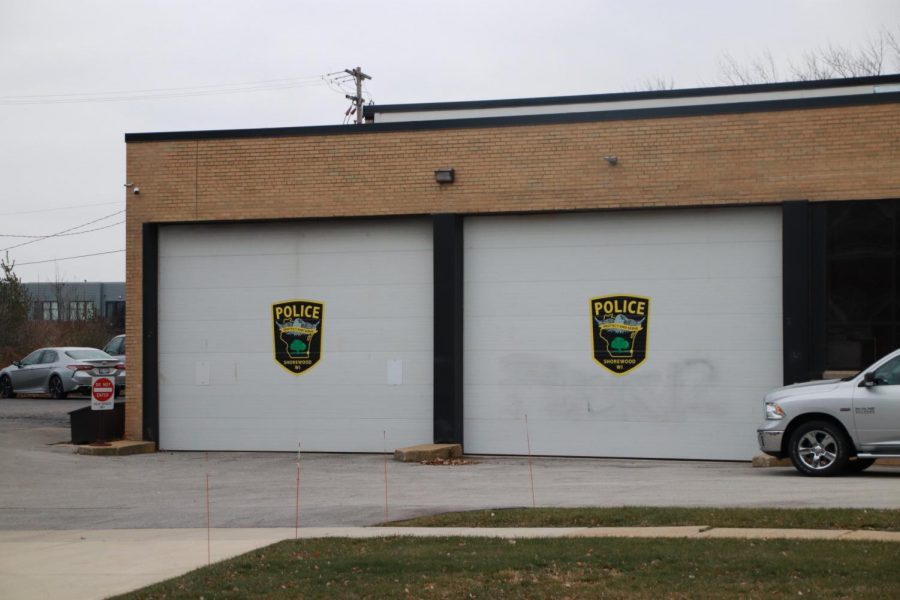Police study recommends changes
Community discusses alternative police complaint filing process
The Shorewood Police station on Wilson Dr. A police study sparked discussion around the complaint process
The village board contracted an organizational study of the Shorewood Police Department done by Alexander Wiess in August of 2020. This action was not incited by the Black Lives Matter movement last summer, which prompted national dialogue on policing; however, the movement did influence the focus of the study.
“The village board sought out consultants that weren’t looking only at financial aspects of policing, but also looking at community engagement in policing,” said Charles Carlson, police commissioner. “It was a definite scheduled organizational study but that organizational study took on new meaning based on … the events of this year.”
The Police Accountability Committee of Shorewood Moving Forward and Shorewood Solidarity Networking is a group working to promote racial equity in policing. They played a role in making sure the routine study addressed more than just finances.
“Our engagement was instrumental in ensuring that the recent study of SPD by Alex Weiss included issues of equity, and we were pleased to see that his report pointed to most of the challenges that have been surfacing during our research,” the group said in a statement.
The results of the study were released to the village in early December 2020. The report outlined numerous suggested improvements to be implemented.
Village trustee and Public Safety Committee Chair Kathy Stokebrand says the timeline for these procedures to be put in place is not fully set, but changes will be occurring in the next several months.
“I think certainly the improvements to the reporting system — the anonymity, the progress reports, the six weeks to have an investigation completed — I think you’ll see those all coming within the next couple months,” Stokebrand said.
The police department will work with the groups involved to make the necessary changes as concrete, actionable decisions are made.
“We’ll be working with the public safety committee and the police commission to look at our current policy and how it is written and also look at the forms that are used,” Peter Nimmer, Shorewood Chief of Police said. “Then at that point — after those discussions — if there are any changes needed to the policy and the forms, that will be done, and then it’ll be put into policy and put on the website.”
One of the main concerns that has been communicated by village residents, and was reinforced by the Weiss study, is the police complaint filing system. Currently, complaints against the police department are submitted only to the police department.
“Since I’ve been on the police commission since May, the complaint is given to and received by the police department, it is investigated by the police department and is determined by the police department the validity of the complaint,” Carlson said. “So at the moment the complaint process is completely within the purview of the police department.”
An alternative option for processing complaints is the police commission, an independent group that already exists. Despite some confusion, the police commission is legally allowed to receive complaints, but at this point has not. To change this, the commission would simply decide to enact Wisconsin Statute 62.13 and/or Section 504. Informal Citizen Complaint Process of the Rules and Regulations of the Police Commission for the Village of Shorewood, both of which allow them to receive complaints. The commission could also be asked by the Public Safety Committee to begin receiving complaints.
“Typically in the past the complaints have come to the police department but the commission … [has always been able to] receive a complaint,” Nimmer said. “If they receive a complaint then they would have to respond to that complaint… I think there was just a little bit of misinformation there.”
Right now the commission meets on an “as-needed” basis. Their responsibilities include hiring, firing and disciplining, and they only meet when necessary. In 2020, the group met only once. At that meeting, their official action comprised voting on the new commission president and secretary.
Police commissioner is a volunteer position, and handling complaints would add more to the job description.
“The issue, at least in my mind, of doing that, it would, for me personally, it would change very much what this volunteer position is,” said Mike O’Brien, police commission president. “As far as the time commitment, if the police commission received a complaint then we have to do all the investigating and things on it. I just think that would be a little bit above where the commission currently is.”
However, Carlson argues that receiving complaints falls right in line with the purpose of the commission.
“It’s a common way for communities to have community oversight of police,” Carlson said. “Police law-enforcement are given exceptional power in the US. Police commissions were set up so that there wouldn’t be political influence over the police department but also that there would be community engagement with the police department.”
Since 2018, there have been six complaints successfully filed against the Shorewood Police Department. One of the main concerns with the police complaint filing system is that it is currently difficult to submit an informal complaint.
“I can say that a few years ago I attempted to file a complaint, and in the process it was made clear that if the officer did not break an actual law, then my complaint wasn’t valid … so I did not officially file a complaint,” Carlson said. “Since I’ve been involved with policing in Shorewood, I’ve heard on numerous occasions of people having an issue but them not feeling comfortable filing a complaint about the issue because it didn’t rise to the level of a law being broken.”

